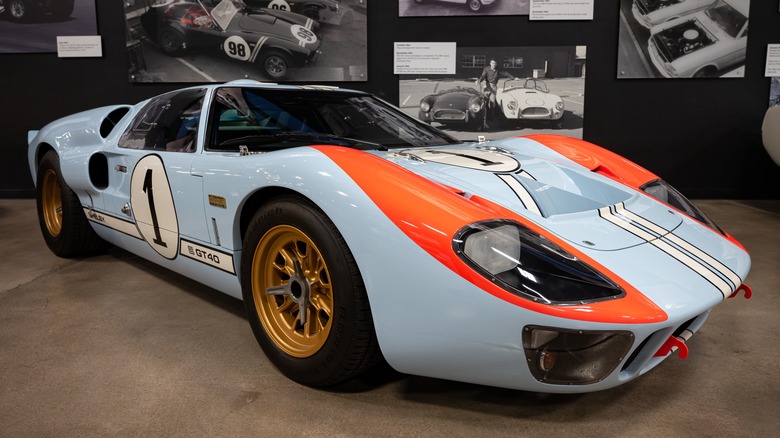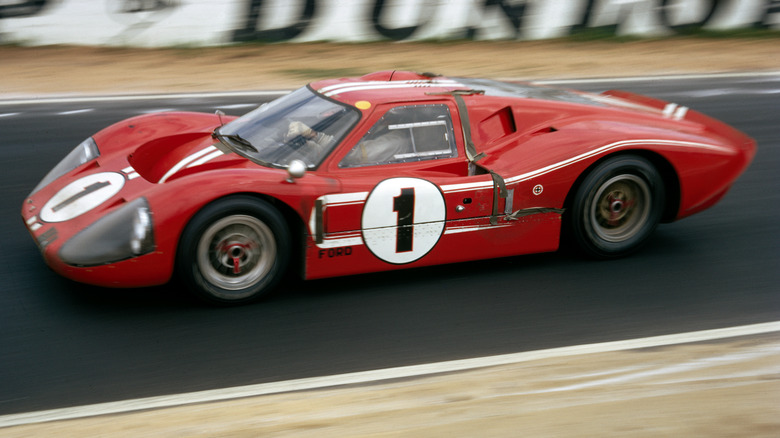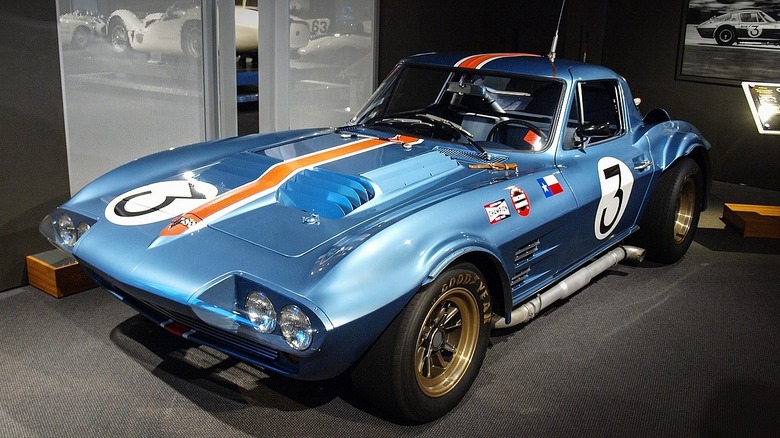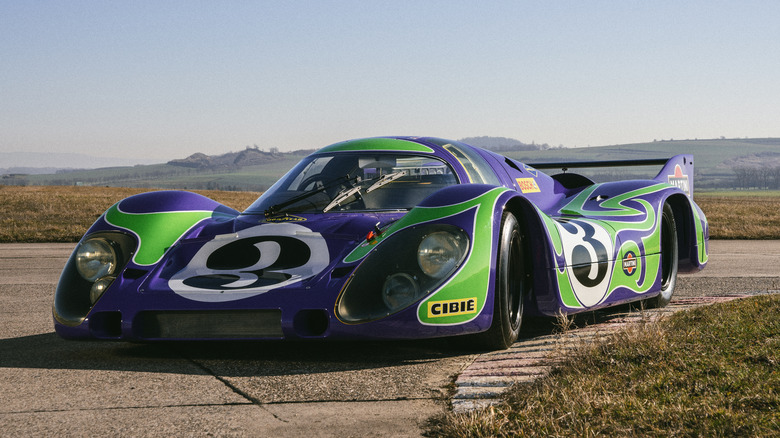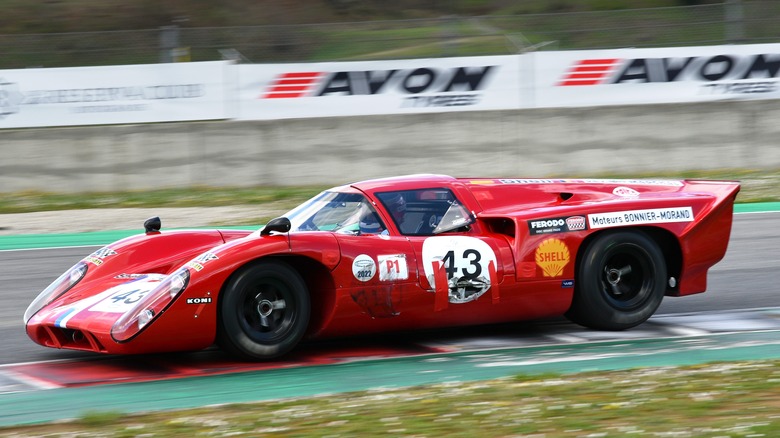4 Legendary 1960s Racecars You Can Buy As A Kit Today
Contemporary car enthusiasts are truly lucky to be living in a golden age of fast cars. Everything from technology-packed Teslas that can accelerate from zero to 60 mph in under two seconds to Dodge Charger and Challenger SRT Hellcats equipped with over 700 horsepower and a 36-month factory warranty. But perhaps you're in the market for something more unique — something you won't see anyone else driving on the streets of your hometown.
The automobiles below will certainly command attention anywhere they go because all four were designed to compete in the prestigious 24 Hours of Le Mans, a French endurance race that is run annually each year since May 1923. Except for when World War 2 was raging, that is.
They're also sold only in kit form, which means that the manufacturer supplies a varying degree of parts and sub-assembly, but the finished project is assembled into a functioning vehicle by the car's owner. While these high-quality kits certainly aren't inexpensive, they're still a relative bargain compared to the real deal — vintage race cars that regularly sell for six or seven figures. Plus, building a kit car can be extremely educational and fun, with an unmatched sense of pride in the finished product.
Ford GT40
Ford's iconic GT40 is probably the most recognizable car on this list, even to folks who know little about automobile racing. In the 1960s, Ford wanted to project a sportier image for its brand by increasing participation in auto racing, particularly the prestigious 24 Hours of Le Mans long-distance race. As depicted in the blockbuster 2019 film "Ford v Ferrari," Ford reasoned that the quickest way to jumpstart its racing program was to purchase the Italian automaker Ferrari.
After Ferrari spurned Ford at the last minute for fellow Italian automaker Fiat, Ford developed its own track monster in a collaboration with racing legend Carroll Shelby. The GT40 went on to win Le Mans every year between 1966 and 1969. Nowadays, GT40 replicas are extremely popular, with several manufacturers in the space. But Fraser, Michigan-based Race Car Replicas bills its vehicles as the most accurate, with body panels molded from original GT40 cars and aluminum frames and suspension components, just like the real thing.
Prices for the kit range from $28,295 to $48,595 depending on the level of completeness. In any case, buyers will have to supply their own small block Ford V8 engine, which can run from mild to wild. Because the car is notoriously short — the "40" in GT40 refers to the car's 40-inch height — Race Car Replicas offers an optional fiberglass bubble above the driver's head to accommodate taller folks.
Corvette Grand Sport
Okay, so we cheated a little with the title of this article. The Corvette Grand Sport never actually raced in LeMans, but it was sure meant to. In the early 1960s, the chief engineer of the Corvette program, Zora Arkus-Duntov, wanted to build a special lightweight race car based on the brand-new C2 chassis to win the GT class at Le Mans. Chevrolet would need to produce 125 units to meet the homologation rules to participate in the race, but after constructing just 5 cars, General Motors executives killed the program and insisted that the existing cars be destroyed.
Fortunately, Duntov defied his bosses and stored two of the cars, while selling the other three to independent race teams. The cars were indeed very successful racers in private hands but never made the trip across the Atlantic to LeMans. Today, you can buy a recreation of the forbidden racer from Superformance, a company best known for its replicas of the Ford Cobra. As you might imagine, it wasn't easy for Superformance to secure the license from General Motors to start knocking off classic Corvettes, but after eight years of perseverance, it received the green light.
Pricing for the repro Grand Sport starts at $114,900 for a complete state-of-the-art tubular chassis with body. It's up to the buyer whether they want to install a Chevy engine and transmission of their choosing or whether they'd prefer to have Superformance handle the heavy lifting before delivery — at extra cost, of course. Other options include power windows and air conditioning, two things you'd never dream of in an original Grand Sport.
[Featured image by Alan Raine from Cheshire via Wikimedia Commons | Cropped and scaled | CC BY-SA 2.0]
Porsche 917
Porsche unleashed the 917 on the world in 1969. Shortly thereafter, the 917 delivered Porsche its first-ever overall win at 24 Hours of Le Mans in 1970, an accomplishment that it would repeat in 1971. Over the course of the early 1970s, the 917s grew ever more powerful through a combination of turbocharging and larger displacement motors, topping out at over 1,100 horsepower. The 917 is also famous for an outsize role in the Steve McQueen film "Le Mans."
Since any of the surviving 917s are now too valuable for serious racing, Race Car Replicas comes to the rescue again with its RCR 917 homage. In some ways, this replica may be better than the real deal because an aluminum monocoque center frame replaces the thin tube chassis of the original, which was well known to be squirrely.
Unlike the original car, which was a flat (horizontally opposed) 12-cylinder, many buyers of the RCR 917 opt for a flat 6 from Porsche's 911 instead, either naturally aspirated or turbocharged. Kit builders on a budget can also utilize a Chevy LS-series V8 instead. The 917 kit is priced at $51,000, less the powertrain. Best of all, it can be made legal for street driving with a DOT-legal windshield and lights.
Lola T70 Mk3
The Lola T70 was envisioned as a worthy successor to Ford's GT40. Like the GT40, the T70 paired a raucous American V8 with a sophisticated European chassis. But the one thing Lola lacked was deep enough financial backing and as such, success at Le Mans continually evaded the car's designer, Eric Broadley — though, to be fair, it was victorious at other racing venues such as the storied 24 Hours of Daytona in 1969.
Reportedly, the Chevrolet engines in the T70 coupes did not run well on European fuel, which was akin to regular pump gas as opposed to the aviation gasoline that was approved for use when racing in America. The pinnacle of the T70 was a version with a monocoque chassis — similar to what's now known as unibody construction — called the Mk3. Approximately 15 T70 Mk3s were produced throughout the early 1970s, with some additional units constructed from spare parts in the ensuing decades, known as continuation cars. Because of their rarity, prices for original cars can reach hundreds of thousands of dollars, depending on condition and provenance.
Fortunately, Race Car Replicas brings us a faithful recreation, the T70 MKIIIb Coupe. Like the original, it has a fiberglass body over an aluminum monocoque chassis, but with improved Computer Numerical Control (CNC) machined suspension components, a technology that was only in its infancy at the time of the original Mk3. Also like the original, kit builders can choose a Chevrolet or Ford V8 for propulsion. Pricing for the kit ranges from $29,145 to $48,395 depending on the number of components that the owner wants RCR to provide versus sourcing themselves.
